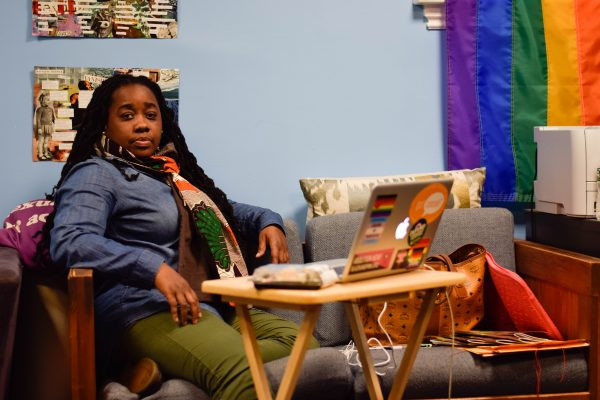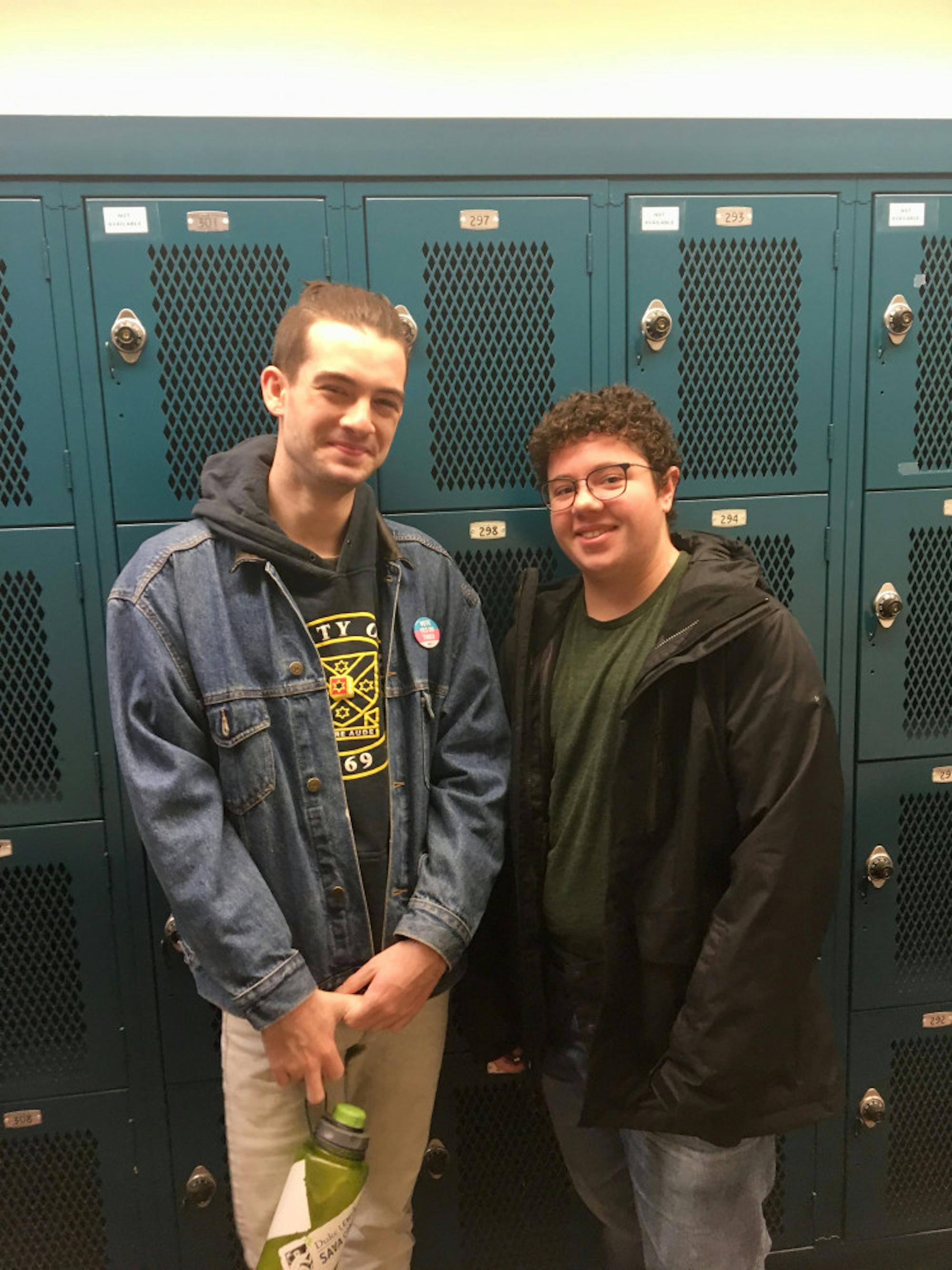The Trump administration is reportedly looking to introduce a narrow definition of gender "as a biological, immutable condition" determined at birth, according to an Oct. 21 New York Times article. The Times explained that the new definition can eradicate federal recognition of an estimated 1.4 million transgender and non-binary Americans which could lead to implications in legal, education and health systems as well.
Hope Freeman, director of the LGBT Center, released a statement on Oct. 24 to condemn the administration’s proposal while reaffirming the institutional commitment to support trans and queer community members at Tufts.
“While this policy has not been officially announced or implemented, we feel compelled to call out what would be a gross misuse of power if such a change were implemented,” Freeman wrote. “We recognize that trans and non-binary people deserve protection, assurance, and respect … We recognize that educating ourselves and others is critical to combating misinformation and intolerance.”
Associate Provost and Chief Diversity Officer Robert Mack reaffirmed Freeman's remarks and said that the university will continue to advocate for trans and queer community members at Tufts.
“If the Trump Administration were to revise the definition of gender, it would be a major setback for the community nationwide and at Tufts. But as always, Tufts would be there to support its students and to give them safe spaces ... Tufts would continue to support these students in the many ways the university has supported them,” Mack told the Daily in an email.
Karen Richardson, dean of admissions and enrollment management, said that the university will continue its current admissions policies of encouraging students to express their gender identities and expressions on their applications, regardless of the Trump administration’s policy changes.
“We believe that diversity in its various forms is important to fostering a dynamic climate that encourages learning, transformational experiences and respectful conversations,” Richardson said. “While I can’t speak to the legal implications of the potential Trump administration changes and their potential national impact, I can confidently say that we would continue to do what we have always done: evaluate the whole applicant to discover and appreciate the person they would be in our campus community.”
The news was especially difficult for many transgender and non-binary students at Tufts, including sophomore Hayden Wolff, who identifies as trans masculine.
“I cried. I was really frustrated and upset,” Wolff said. “It was particularly upsetting because I could not understand what the purpose of that announcement was. Was it to gauge people's reaction right before the midterm? Was it to rile up people? When someone says that my identity is not real and I do not exist, what should I make of that?”
Wolff said that for him, the news exacerbated an already strenuous week, as Question 3 was soon to be voted on the 2018 Massachusetts ballot, which would uphold or repeal a law that protects transgender and genderqueer people from discrimination in public spaces.
“You know that things are getting serious when your friends start texting saying that they care about you and that you are valid. Reading my friends’ texts, I decided to put up a sign on my door [from the transgender rights rally] to remind myself that my existence is not a debate,” Wolff said.
Thomas Chan, who identifies as genderqueer, similarly said that they are afraid of the potential policy change.
“I was very sad, angry and scared. It is a weird combination of emotions that, sadly, have become more common for me in the current political climate … We had to fight for Yes on 3, and we still have to worry about this. And I’m scared because this paves the road for discrimination [at a federal level],” Chan, a junior, said.
Freeman said that she believes the administration’s effort to redefine gender is a political strategy.
“When we speak of the LGBTQ community as a whole, they make up a relatively significant percentage of population in the United States, roughly around four to five percent. However, when it comes down to the transgender, non-binary people alone, it gets much, much smaller than that, less than one percent of the population. So, why is the administration honing in this particular group that faces a lot of adversity and is already marginalized historically?” Freeman said.
Freeman added that she feels the Trump administration is unfairly targeting transgender and non-binary communities.
“It feels like some politicians are trying to find another group to target. Some politicians are trying to find scapegoats for the country’s existing tensions and problems, when in fact, these targeted groups are just trying to live their lives and get through their days just like any of us," Freeman said. "I think it is extremely unfair that a marginalized community within an already marginalized community is being targeted."
Sean Murphy, a junior who volunteered for and organized the Yes on 3 campaign on campus, said that Tufts should take steps on an institutional level to ensure that transgender and non-binary students feel protected.
“As transgender students find it increasingly difficult to rely on the federal government for their basic human rights, Tufts University needs to put an extra effort so that students can feel safe within that jurisdiction and make up their lost ground,” Murphy said.
Murphy added that if the federal government were to redefine gender, Tufts University should reject that definition.
"While Tufts University's main role is to provide quality education to its students ... the university is also responsible for investing in its students' well-being and health. That is why the university has the Department of Health and Wellness and Tufts Mental Health Counseling services in place," Murphy said. "Tufts, [as a leading national research university] with powerful financial and legal resources, is capable of and should protect its trans and queer students against the federal government ... through concrete actions. Trans and queer students at Tufts do not have such resources to fight against the federal government."
Wolff also said that more can be done to make transgender and non-binary students feel welcomed and included at the university.
“I originally applied to Tufts not only for its academic excellence but also for its reputation of supporting [the] queer and transgender community along with its commitment to diversity and inclusion," Wolff said. "Even though I made great friends here and have support from the LGBT Center, things turned out to be very different at Tufts from what I thought it was going to be like."
In particular, Wolff said that the university could have done more to support the Yes on 3 campaign.
“Question 3 on the midterm was a very important issue for me, and I was even thinking about transferring to a school out of Massachusetts if the people were to vote 'no' on three. I did not want to attend a school in a state where my safety in public is not guaranteed just because of who I am,” Wolff said. “Even though the university joined the coalition to stand for 'yes' on three with other universities in Massachusetts, I was largely disappointed by the lack of concrete institutional support on the issue.”
Murphy echoed Wolff's sentiments.
“[Freeman] was there throughout the process for the community, but the university could have done much more to support the cause … They could have posted the issue on their Facebook or Instagram account to inform the student body and even alumni. [University] President [Anthony] Monaco could have joined the phone banking event to galvanize support the transgender community," Murphy said.
Transgender and non-binary students whom the Daily interviewed all said Tufts could extend greater support for their community, amid the debate over Question 3 on the 2018 Massachusetts ballot and more recently, the Trump administration's proposal to re-define gender as determined at birth.
Wolff said that the university needs to address its own bureaucratic red tape that impact the activism of transgender and non-binary students.
“The installation of gender-neutral bathrooms on campus took years of student activism and demands, even though it was clear that it was what the student body needed,” Wolff said. “Personally, even changing my names on the system was difficult. I got emails after emails directing me to another person in charge. Tufts University should spend more time and resources to make the system more fluid.”
Chan agreed with Wolff.
“It takes long for these issues to be addressed due to bureaucracy, and I understand why," Chan said. "The main issue, however, is that these issues impact trans and queer students' everyday experiences. And putting their needs in a queue that will be addressed months or years later is unacceptable."
Mack said that his office is working with the LGBT Center to resolve some of those difficulties to better support transgender and non-binary Tufts students, including improving faculty training.
"[The LGBT Center and other university offices are] looking into ways to better streamline the updating of common use names across electronic systems where students may interface with the university,” Mack told the Daily in an email. “[The university hopes to provide] support for faculty concerning professional development with [the] Office of Equal Opportunity and the Office of the Chief Diversity Officer on better supporting trans and non-binary students in their classrooms.”
Murphy said that the university's leadership should also better reflect the identities of the student body.
“[A] recent Daily article revealed that Tufts ranks 87th in gender parity among leadership just in Massachusetts [out of 93 universities and colleges]. The article goes to show the lack of representation of marginalized groups in the university's leadership,” Murphy said. “I trust queer administrators to better understand and advocate for queer students’ rights much more than non-queer administrators, even though [non-queer administrators] can be great allies.”
Despite these criticisms, Sidney Hillwig, who identifies as trans masculine, said that the university's assurances of quality trans health care was crucial in his decision to apply and ultimately attend Tufts.
"I came to Tufts because the Tufts insurance promised to cover all aspects I felt necessary to my transition ... These were all I needed to know that Tufts was the best institution for me to go," Hillwig, a sophomore, said.
Freeman said that the persistence of student activism in spite of institutional red tape, particularly for the transgender and non-binary communities, gives her a sense of hope for the future at Tufts and beyond.
“Students on this campus recognized that they were not getting the service and support they needed, so they rallied and protested to get these resources. It was a long process, but they ended up getting [recognition] and [the Group of Six centers] have been here on campus ever since,” Freeman said. “Last year, I was struck by how student activism pushed for gender-neutral bathrooms on campus. Students’ activism and engagement on campus gives me hope that the future can be brighter at Tufts.”
Caitlin Colino, a first-year student who volunteered for the Yes on 3 campaign as an ally, said that people, and especially allies, need to unite on behalf of transgender and non-binary individuals.
"When there are threats from the government to take away a group of people's rights, we have to stand against it. It's not a choice ... I know that it is easy for us [as college students] to say 'But I don't have time because I have an essay to write.' If the decision boils down to getting a few points less on your essay and advocating for a cause you stand by, I'd say it is worth fighting for what you believe in," Colino said. "I believe that showing up to support the community on campus has meaning in itself."
Hillwig said that progress in trans and queer civil rights and liberties will only be achieved through the tireless work of activists both at Tufts and across the United States, with much of the burden falling upon transgender and non-binary individuals themselves.
“As an optimist, I see the issue moving ever forward, because I believe in Dr. [Martin Luther] King’s judgment of the arc of the moral universe. I know there will come a time where all people can move through their lives without fear of their gender being used against them, where they are not painted as potential criminals for going to the bathroom, where they are supported by the infrastructure of the country with their healthcare needs whatever those may be,” Hillwig said. “I don’t think this world will simply come. It will come on the tired backs of those giving all they can to its progress, who are already tired from the state of the world.”
Freeman encouraged members of the Tufts community to empower and support each other in activism for transgender and non-binary individuals, amid such challenging times.
"If you are tired of not getting what you need, being forgotten and not considered, mobilize and demand what you need ... I am always here to support and lift up the voices that need to be heard at Tufts. Listen carefully others, educate yourself and put yourself into others' shoes,” Freeman said.
Echoing Freeman's sentiment, Hillwig said that the community should not lose hope in these times.
“Remember that your very existence is an act of revolution and a show of your strength. As difficult as it may be, don’t lose hope. Use your resources and connect your fellow family to them. Nobody has to be alone through this,” Hillwig said. “Remember that in the daylight and in the shadows there are forces working to bring all of us peace and justice. Be a part of those forces if it is feasible and safe for you. Use your voice if it is feasible and safe for you. We will fight this until there is nothing left to fight.”
Freeman called on the entire Tufts community to become leaders in supporting the transgender and non-binary communities, in spite of the Trump administration's new proposal.
“This can be an opportunity for Tufts University to make a stronger commitment to support trans and non-binary community members and lead other institutions in the movement," Freeman said. "Tufts should be able to say that we recognize that this is a new federal guidance, but we will continue our current practices [of supporting trans and queer students] because the university is committed to supporting our trans and queer students, faculty and staff.”
Editor's note: This story was published in two parts in print. Part 1 was published on Nov. 27 and Part 2 was published on Nov. 28.
Students, administrators respond to Trump administration's proposed definition of gender

Junior Sean Murphy and sophomore Hayden Wolff pose for a photo in Tisch Library on Nov. 10.





